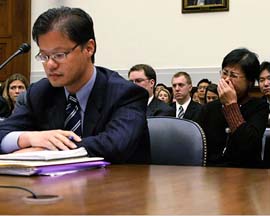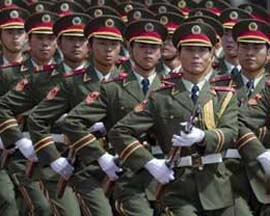 It was a pitiful scene. Jerry Yang, co-chairman of Yahoo, was being hammered before the U.S. House Committe on Foreign Affairs.
It was a pitiful scene. Jerry Yang, co-chairman of Yahoo, was being hammered before the U.S. House Committe on Foreign Affairs.
Yang, a Taiwanesse American worth $2.2 billion, was taking heat because his company's actions sent a Chinese dissident to prison. His eyes downcast as he testified, the dissident's mother, Gao Qin Sheng, sat behind him during the hearing and wept. Nobody can understand the pain experienced by a mother who has a son or daughter in prison. Or worse, a Chinese prison.
What was Shi Tao's crime?
Tao is a Chinese business journalist who was arrested and imprisoned for leaking state secrets. In 2004, he passed along a Communist Party document to a pro-democracy Web site outside of China. The document was a directive from the Communist Party instructing the mainland Chinese media not to report on the return of human rights activists to China to mark the 15th anniversary of the Tiananmen Square massacre.
 In 2005, Shi, a pro democracy journalist who also advocated free elections, was arrested and sentenced to 10 years in prison. He is listed as one of the plaintiffs in the lawsuit against Yahoo.
In 2005, Shi, a pro democracy journalist who also advocated free elections, was arrested and sentenced to 10 years in prison. He is listed as one of the plaintiffs in the lawsuit against Yahoo.
In that lawsuit, Tao claims that Yahoo violated U.S. law when it turned the information over to Chinese officials.
At several points during the Tuesday hearing, Yahoo's Yang mumbled barely-audible answers like a small schoolboy responding to reprimands from from his elders.
Answering one of Chairman Tom Lantos, D-Calif., questions, Yang said: "I think we made some errors: I think we could have done better, we have apologized for that and I feel like we’re having a dialogue now about how to move forward."
He turned in his chair, bowed to Gao Qin Sheng and apologized. Yahoo general counsel Michael J. Callahan also bowed and apologized.
Later Yang said: "We're doing our best to secure the freedom of these prisoners." Those efforts include talking to federal officials in China and the US State Department.
Lantos was not satisfied with any of the answers.
"While technologically and financially you are giants, morally you are pygmies," Lantos said angrily after hearing from the two Yahoo executives.
During the bruising committee hearing, Lantos, a San Mateo Democrat, called the Internet giant "spineless and irresponsible."
The congressional show trial underscored the ethical shoals Silicon Valley companies must navigate in the global economy. Even as Yang and Callahan testified, the lure of overseas markets was highlighted as shares of Alibaba.com, which owns China's largest online business-to-business Web site, nearly tripled during its first day of public trading in Hong Kong. In 2005, Yahoo invested $1 billion in Alibaba and owns about 40 percent of the company. Alibaba now runs Yahoo China.
Another Internet giant, Google, refused to comply with demands by China to turn over information. Google has steadfastly refused to turn over similar data to the U.S. government.
It doesn't take much spine to do that sitting thousands of miles away.
There are some huge ironies here.
Yang's personal worth is estimated at $2.2 billion. His company is on the Fortune 500 list of largest companies. It is also on Fortune's list of the 25 best places to work. Yahoo's Web site proudly points out that it is the only company on both lists.
The company took a financial drubbing on Wall Street a day after the congressional hearing. Shares dropped 7.7 percent. Yahoo's stock decline exceeded the 2.7% fall in the tech-heavy Nasdaq stock index. And it came despite an upgrade by Standard & Poor's.
This shows that a company's action can still mean pressure in the market place. Despite greed, the market place can still produce corrections to a company's irresponsible actions.
In the confines of a dark and dank Chinese prison, all that cash and a pleasant work place mean very little to Shi.
In Soviet Russia dissidents called a 10-year sentence a tenner and it meant ten years in a Russian Gulag. Other than a bullet in the back of the head, a tenner was the maximum sentence before the collpase of the Union of Fewer and Fewer Republics. Few people serving tenners in Russia's prisons expected to survive a tnner, so it was essentially a life sentence.
A prison in mainland China is certainly no better.
The company sometimes uses the jingle "do you Yahoo?"
I don't Yahoo and I won't Yahoo in the future.
I'm sure Jerry Yang and David Filo are trembling behind their desks. Do you think either of them would trade places with Shi?



